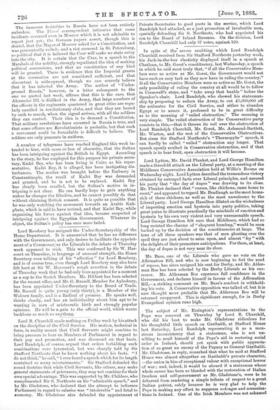Lord R. Churchill made nothing on Friday week by his
attack on the discipline of the Civil Service. His motion, technical in form, in reality meant that Civil Servants might combine to bring pressure to bear on Members of Parliament in regard to their pay and promotion, and was discussed on that basis. Lord Randolph, of course, argued that orders forbidding such combinations were tyrannical, but was sharply told by Sir Stafford Northcote that he knew nothing about his facts. "I do not think," he said, "lever heard a speech which for its length contained so many misstatements." Sir Stafford defended the sound doctrine that while Civil Servants, like others, may make general statements of grievances, they may not combine for their own special advantage. This was supported by Mr. Childers, who complimented Sir S. Northcote on his "admirable speech," and by Mr. Gladstone, who declared that the attempt to influence Parliament in regard to salaries was " intolerable " and fatal to economy. Mr. Gladstone also defended the appointment of Private Secretaries to good posts in the service, which Lord Randolph had attacked, as a just promotion of invaluable men, specially defending Sir S. Northcote, who had appointed his son to the Board of Inland Revenue. On the division, Lord Randolph Churchill had only 37 votes, against 120.


































 Previous page
Previous page